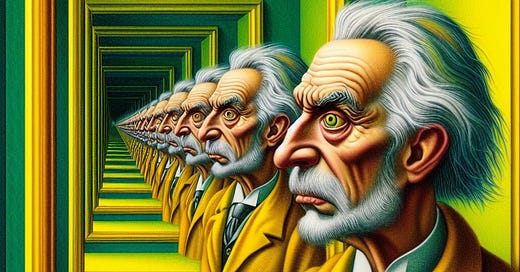Exploring the Labyrinth: Borges, Magical Realism and the Vedantic Vision
Blurring the Lines Between Reality and Illusion.
Magical realism is a literary genre that fuses magical and real elements, incorporating rational and unexplainable events. The stories and novels of this genre present us with supernatural and fantastic events as if they were an integral part of everyday reality. This combination of dimensions of reality, normally perceived as separate, has a powerful impact on our minds. When we read these stories, we feel catapulted into a dimension where everything becomes possible and unexplainable.
When our minds are free from their usual structures, we can gain insights and glimpses of this deeper Reality. Reading magical and unexplainable events in a realistic context allows us to naturally replicate this experience of opening the mind. The boundaries between possibility and impossibility become confused, and we can access a wider space of understanding in those moments.
Together, magical realism and Vedanta offer us a key to exploring the deepest aspects of existence and embracing an expanded vision of reality. They invite us to look beyond appearances and discover the beauty and complexity that lies beyond our common perceptions. Both through reading literary works that embody magical realism and through the study and practice of Vedanta, we can enrich our understanding of life and our place in it.
In a world where we often find ourselves trapped in the limitations of the rational and the everyday, magical realism and Vedanta offer us the possibility to explore the infinite richness of our consciousness and to embrace a vaster vision of reality. They are tools that help us overcome divisions and recognize the interconnection between all forms of existence. Whether we immerse ourselves in magical stories or explore the depths of Vedanta philosophy, we can discover a source of inspiration and wisdom that guides us on our path to knowledge and enlightenment.
Dreamlike realities: Borges and Vedanta
Jorge Luis Borges occupies a special place among the authors who helped define magical realism. In his labyrinthine stories, which interweave fiction and reality, deep resonances sound with Vedanta's thoughts.
Borges leads us into parallel worlds, where "all things happen at once, in an instant without duration" (Fictions). They are dreamlike dimensions, on the border between waking and sleeping, where perception and imagination blend, and where every event seems permeated with recondite meanings.
Yet, as Borges himself notes, "dreams tend to be chaotic" while "literary ones are not." His is not an abandonment of the unchecked flow of the unconscious, but the creation of universes governed by precise internal laws: "Fictions of fictions, that multiply into fictions and that depict a labyrinth" (The Artificer).
It is an approach that recalls the Vedantic idea of "Maya", the creative power of the mind to generate phenomenal dimensions endowed with a semblance of objective reality. They are imaginative yet structured worlds, which acquire a paradoxical consistency precisely thanks to their visionary coherence.
As Borges states: "The aesthetic fact will always be a miracle, because uniting different realities, as man does, is to create" (Seven Nights). It is an act that evokes how, according to Vedanta, the incommensurable Brahman manifests itself in the world of forms. And as in Vedanta, in Borges phenomenal multiplicity reveals its illusory origin, ultimately leading back to the One.
In his science fiction stories, the intuition of the infinite behind the finite, of the eternal embracing the ephemeral, emerges ever more clearly: "Everything happens, nothing happens just once. Nothing is identical to another, but each one is always infinitely repeated "(History of the Night).
It is the typically Vedantic vision of a multiverse of "forking worlds, multiplying" (The Garden of Forking Paths), an ocean of mirror realities in which the one Absolute is resolved. As Borges himself states: "The world is a mirror of mirrors reflecting mirrors" (Mirrors).
Behind the mirror of every ephemeral and relative experience, the Absolute is hidden, Brahman, the only definitive reality. Through his labyrinthine literature, blending mysticism, metaphysics and mathematical rigour, Borges offers us an extraordinary tool to explore the teachings of Vedanta, to concretely experience the dissolution of rational certainties and glimpse the dawn of a broader, more cosmic and unitary awareness. A window onto other worlds, where reality and dream dance in unison until they reveal themselves as the same.
I have woven tales to share, for any who care to read them. My books await you on Google Books. Check also my stories on Medium.com.
I would be honoured if you considered subscribing to the Premium Contents of my Vedanta Substack and leaving feedback, comments, and suggestions both on this page and by writing to me at cosmicdancerpodcast@gmail.com.
Thank you for your precious attention.




